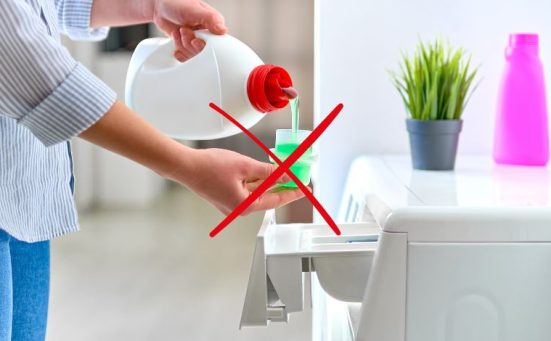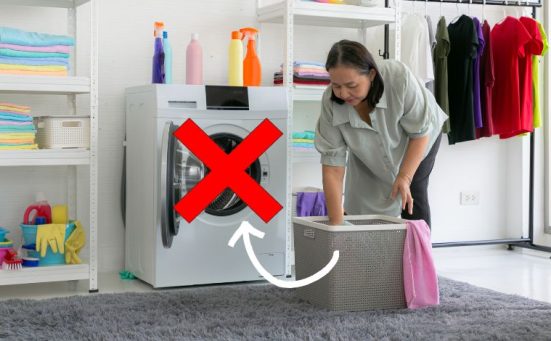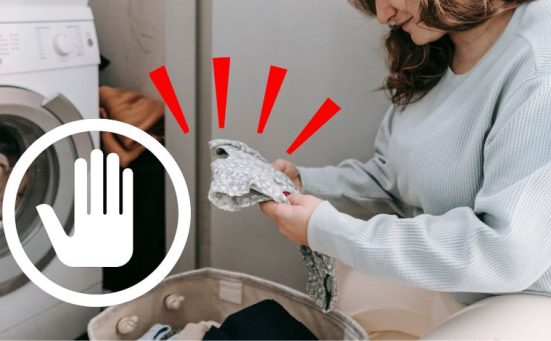
Why Your Washing Machine Is So Loud (and what to do)
If your washing machine has recently become noisy and loud when in operation it can be annoying, frustrating and worrying. If this sounds like your washer, you shouldn’t ignore it, you need to act fast to prevent a serious fault developing.
However, there’s no need for immediate panic as there are a number of reasons for the sudden onset of noisy operation. If your washer has recently become much louder when running, keep reading.
In this article we look at all of the reasons why a washing machine starts making loud noises when washing, rinsing or spinning the laundry.
What Could Cause A Washing Machine To Become So Noisy?
The normal level of sound generated by washing machines tends to be within the 47-67 dB range. With the average being around 50-55 dB and anything below 50 dB is considered to be a quiet appliance.
If yours has suddenly become noisy, it could be something as simple as the drum being overloaded, or it might mean you need to replace your washing machine.
Let’s take a look at all of the reasons why your washer could have become noisy;
| Possible Cause | Best Solution |
|---|---|
| Unbalanced machine | Adjust the feet, reload the drum |
| Overloaded drum | Reload the drum to within accepted recommended levels |
| Loose items in the drum | Remove any loose objects and remember to check pockets in the future |
| Clogged filter | Investigate and remove any blockages |
| Blocked pump | Investigate and remove any blockages |
| Worn shock absorbers | Replace the shock absorbers |
| Worn or damaged drive belt | Replace the drive belt |
| Defective or broken motor coupling | Replace the motor coupling |
| Defective motor | Replace the motor |
| Worn or damaged drum bearings | Replace the drum bearings |
| Drum or drum spider damaged | Replace the drum and/or drum spider |
| Loose or damaged concrete counterweights | Replace or tighten the concrete counterweights |
Let’s take a closer look at each of these faults and find the best ways to remedy these issues;
Unbalanced Machine
If your washing machine has not been placed on level ground, or the feet haven’t been adjusted correctly, the noise could be due to the machine moving during the spin cycle. The extra vibration will make the machine sound louder than normal.
We recommend using a spirit level to check on the level of your washer and adjust the feet accordingly. If the floor is too uneven, consider moving the washer on to more level ground or place a board under it to help level it up.
If this is not rectified as soon as possible, the vibration could cause one or more of the components of the washer to develop a more serious fault.
If you’re sure that your appliance is on level ground and that the feet have been adjusted correctly, you will need to check on the wash load in the drum. All it takes for a load to become unbalanced is too many items resting on one side of the drum.
This is particularly prevalent in older appliances that don’t have load sensors. Modern machines have load sensors which detect the amount of laundry in the drum, the level of dirt and also adjust the position of the load in the drum to ensure a smooth operation.
In some cases it’s just because you are trying to wash too many large items at the same time. Things like towels, curtains, blankets and rugs can absorb huge amounts of water. This makes them incredibly heavy and can lead to an unbalanced spin.
The remedy for this is to remove a few large items and wash them separately. This should redistribute the weight more evenly and allow the machine to spin without making an excessive noise.
Overloaded Drum
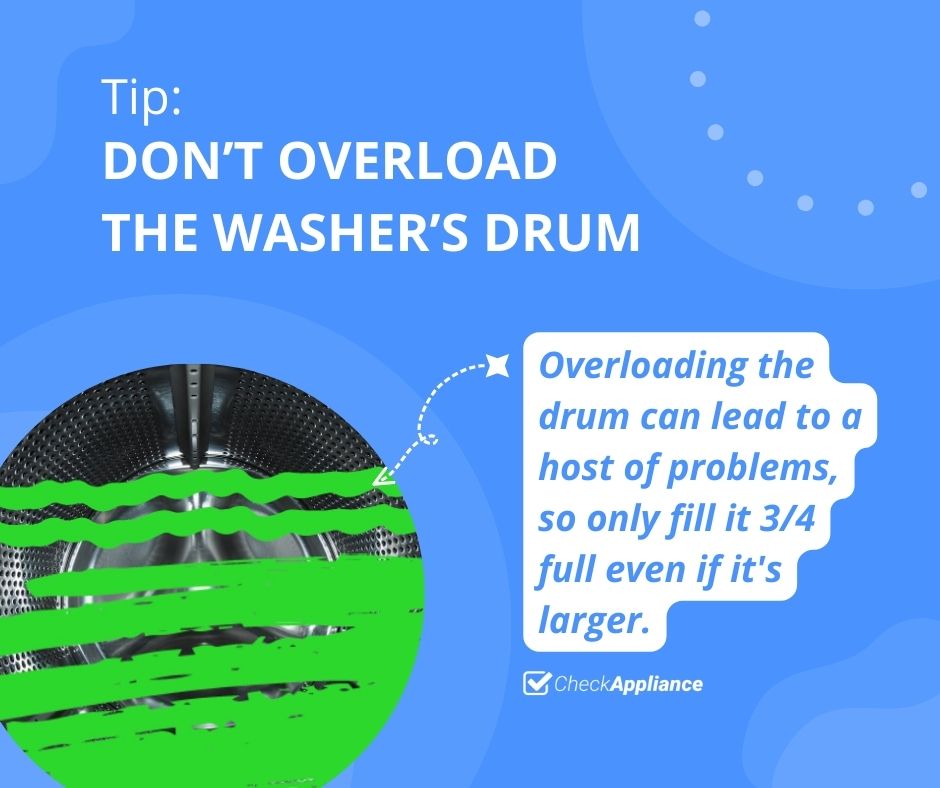
All washing machines have a maximum load capacity which is lower than the drum capacity stated in the user manual. It is widely accepted among experts that you should never fill the drum more than ¾ full to preserve the life of your appliance, save on energy bills and ensure your washing all gets clean.
For example an 8 kg washer should never be loaded with more than 6 kg of laundry. A good way to estimate this in the absence of a weighing scale is to load the drum with laundry and stop when the drum is around ¾ full.
Overloading the drum on a frequent basis will lead to problems similar to and including many of the more serious causes listed in this article. Once the problem develops into something more serious, it will cost you time and money to get your machine working properly again.
By always ensuring the drum is never overloaded, you can help to ensure the longevity of your washer and save you from many unnecessary problems.
Loose Items In The Drum
Loose items can find their way into the washing machine’s drum and start creating problems. Items such as;
- Coins
- Keys
- Screws
- Nails
- Bra wires
- Hair clips
- Pins
Some of these might just rattle around in the drum and cause a loud noise as the drum is rotating. This can be annoying, but won’t cause any harm as such, to the machine.
The problems arise when larger items like keys, or sharp items like nails, screws, pins or bra wires get caught either in the holes in the drum or under the drum paddles.
These items can then cause damage to the clothes as they turn in the drum. But worse than this, they can also cause damage to other components in the machine if they protrude through the drum and get stuck between the drum and the tub.
Anything found in pockets and removed before washing, cannot cause any unwanted noise in the drum of your washing machine. You need to check the pockets of every item before it is placed in the washing machine to prevent this from becoming a problem.
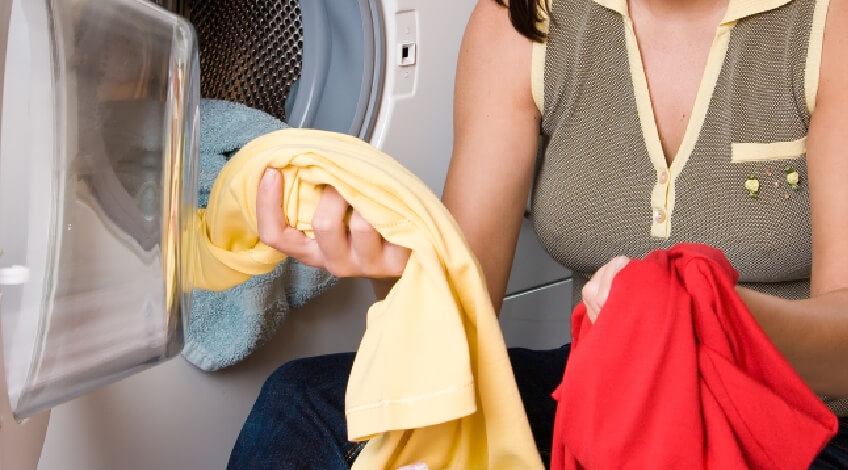
Clogged Filter
The filter in a washing machine needs to be cleaned every so often to prevent it becoming clogged. Small items like buttons, coins etc, can find their way into the filter and eventually lead to a blockage.
As this makes the motor and other components work harder, it can lead to the machine making more noise than normal.
Consult your user manual for the location of the filter on your washer (they’re usually at the front, bottom of the appliance behind a small flap). Check the filter and remove any blockages etc to ensure the smooth running of your washer.
Blocked Pump
If any foreign bodies get caught in the pump, it can lead to the appliance straining to pump water. This extra strain can cause the appliance to sound louder than is normal.
You will need to consult the user manual to find the pump and then check it for any blockages. Once the pump has been cleaned successfully, the noise should abate and the appliance will run as it should.
Worn Shock Absorbers
To prevent the tub from moving excessively during spin cycles, shock absorbers are fitted. Over time, these can become worn or damaged and lead to the machine making more noise than normal.
The shock absorbers will need to be replaced if this is the cause of the problem. This is a relatively easy task and can be done by anyone with a few simple DIY skills.
However, if you’re not sure that the shock absorbers are the cause of the problem. Or if you don’t feel confident in your DIY abilities, we recommend contacting a qualified technician to investigate and undertake this task for you.
Worn Or Damaged Drive Belt
As the name suggests the drive belt is responsible for turning the drum. It is connected to the motor at one end and loops around the end of the drum and transfers the spinning of the motor to the drum.
Over time, these rubber drive belts become worn, frayed and weakened. They are easy to replace and can be purchased online for a small amount of money.
However, the sound created by a worn drive belt is very similar to that created by worn bearings. If you’re not sure which one is at fault, remove the drive belt and turn the drum by hand, if the noise is gone, it’s the drive belt at fault, if it’s still there it’s most likely the bearings that need replacing.
Defective/Broken Motor Coupling
The motor coupling is designed to ensure the smooth rotation of the drum. It is designed to break if the drum is overloaded to prevent damage to the motor or other components.
If the motor coupling is broken, the machine will create a loud noise during the spin cycle. If this is the case, the motor coupling will need to be replaced.
This can be done by a confident DIYer, but if you’re unsure of your skill levels, we recommend contacting a technician to investigate and replace this part for you.
Defective Motor
This particular fault is more prevalent in older style washers which have motors that use a carbon brush. These carbon brush motors are far noisier than modern brushless motors, but if yours has become even more noisier than usual, it could be time to replace the motor.
The brushes in a carbon brush motor have a lifespan of anywhere between 2-10 years. They can be affected by the number of times the washer is used.
If you own an old appliance with a carbon brush motor, and it’s started to make an excessive amount of noise, it could be that the motor needs replacing. You can do this yourself, but as it involves dismantling the appliance to gain access to the motor, as well as stripping the motor apart, we recommend contacting an expert to do this for you.
The average cost of replacing the brushes in a washing machine motor is around £60-£100. You will need to consider whether it’s worth replacing the brushes or putting the cost of this repair towards a new washing machine.
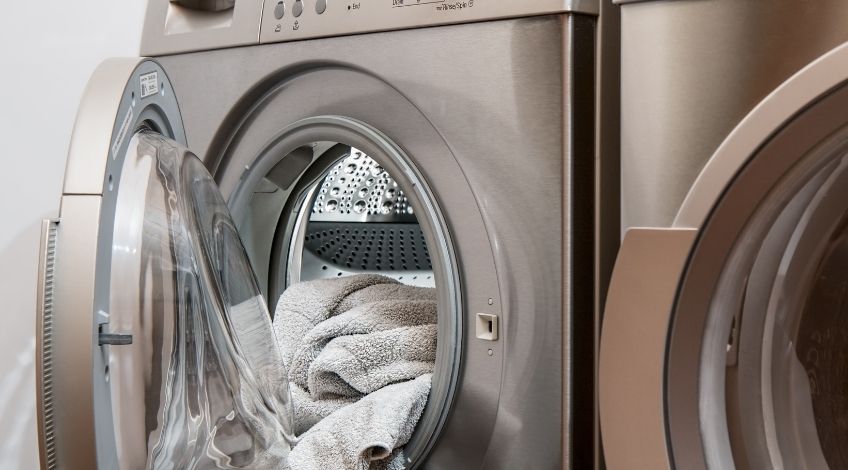
Warn Or Defective Drum Bearings
As we said earlier, the sound created by worn or defective drum bearings is similar to the sound of a worn or damaged drive belt. You will need to check this by removing the drive belt and then spinning the drum by hand.
If the noise is still present with the drive belt removed, it’s most probably the bearings that are the cause. Listen carefully to the noise as it can tell you quite a lot about the condition of the bearings.
A squeaking noise often indicates that the bearings need lubricating whereas a grinding noise is more likely to indicate the bearings are disintegrating.
The remedy for both of these involves removing the outer drum from the appliance after dismantling the top, front and back panels of the washer. As this is a job that will take at least 1.5-2 hours for a qualified technician, this is not a job that can be easily done by an amateur.
In some cases, the outer drum or tub cannot be split which means you cannot access the bearings. If this is the case with your washer, you will need to replace the entire drum assembly.
It might prove more financially viable to replace the appliance rather than replacing the tub/drum assembly. It’s best to get this checked by an expert who can advise you on the best course of action.
Damaged Drum Or Drum Spider
If the drum or the parts that hold the drum in place, the drum spider becomes damaged, it can cause excessive movement of the drum during the spin cycle. This would cause a large amount of noise which typically sounds like loud tapping or banging.
If the drum or drum spider are damaged, we recommend contacting an engineer or technician to replace these parts for you.
Loose Or Damaged Counterweights
Most washing machines rely on concrete blocks as counterweights to prevent excessive movement when the drum is spinning. These concrete blocks are the reason that your washing machine is so heavy and difficult to move.
If one of these blocks has become loose, or has been damaged in any way, they can cause serious and irreversible damage to the appliance. You will need to contact an expert to assess the damage, check the rest of the machine’s components for any damage and/or replace the concrete counterweights.
If you have allowed the appliance to run for some time with loose or damaged counterweights, you may need to replace your washing machine.
Common Washing Machine Noises
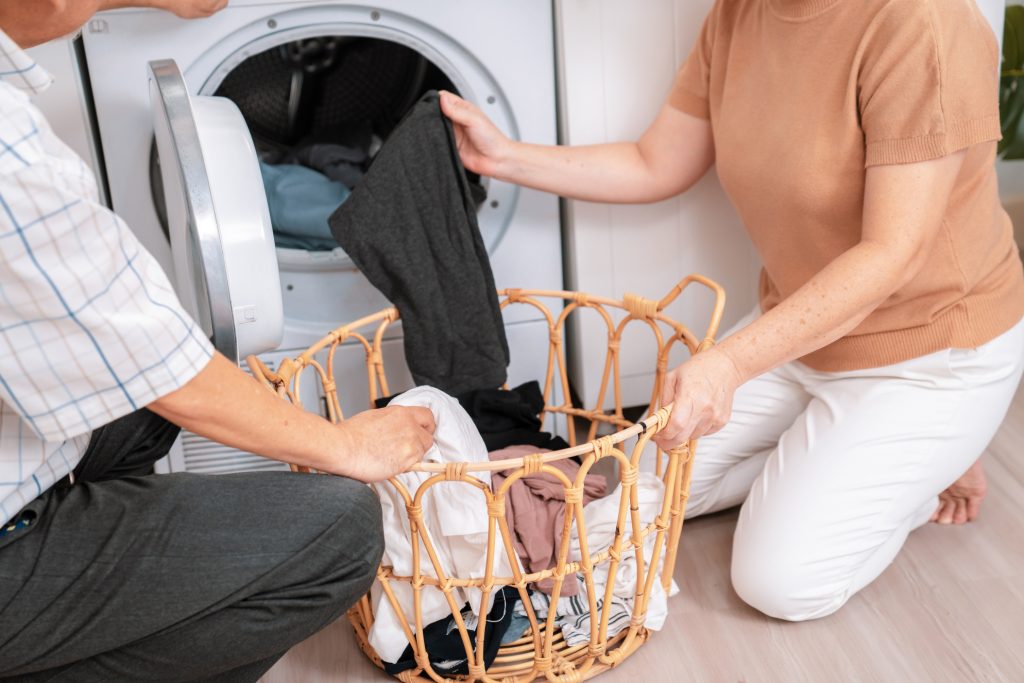
There are many reasons for a washing machine making an unusual noise. As we have seen, some indicate pretty serious faults. However, many are easy to solve and can often be identified by the particular noise they make.
Let’s look at some common noises made by washing machines. These include;
A Banging Noise
If you hear an unfamiliar banging or clunking noise coming from your washer, it could be caused by something moving around in the drum. Items like buttons, zippers, buckles or even smaller objects like coins, screws, nails etc.
In some cases these smaller items can slip between the seal that separates the drum from the outer tub. This results in a rattling or banging sound every time the drum rotates. The faster the drum spins, the louder this noise becomes.
A Clicking Noise
If you are aware of a clicking sound when you start your washing machine that’s not usually there, it’s most likely to be a faulty inlet valve. Over time the inlet valve can become blocked or stuck by rust, limescale or grit etc.
This will eventually lead to the washer not filling with water. You will almost certainly need to replace the water inlet valve to solve this.
A Squealing Noise
If your washing machine makes an excessive squealing noise as it fills with water, it’s most likely caused by the water pressure being too high. You can check this by turning the water inlet tap down slightly.
If the symptoms persist, this will need to be solved by a plumber who will most likely slow the water pressure using the stopcock.
However, a loose or damaged drive belt can also cause the washer to squeal. You can check this yourself or call in an expert if your DIY skills aren’t fully up to scratch.
A Grinding Noise
The most common cause of a grinding noise emanating from the washer is an overloaded drum. A grinding noise could also occur if your appliance isn’t level or sometimes it always grinds when the drum changes the direction of the spin.
However, it can also indicate worn or defective drum bearings or a faulty drive pulley. We recommend calling in an expert to diagnose and repair these faults.
SEE ALSO: Washing Machine Making A Grinding Noise? (try this)
The Point In The Cycle When The Noise Is Heard Can Be Indicative Of The Fault
There are 2 different points in the washing machines cycles when the noise is indicative of the type of fault. These are;
During The Wash Cycle
If the noise is most prevalent during the wash cycle the most common cause is a worn out drum bearing or a damaged drive pulley. These two issues often cause a loud rumbling or grinding sound as the drums rotates.
During The Rinse Cycle
The most common cause of a loud noise during the rinse cycle is an item caught between the drum and the tub. Or something stuck in one of the perforations of the drum rubbing on another part of the appliance. This can cause a loud rattle or banging sound.
Does An Unfamiliar Noise Signal The End For Your Washing Machine?
Hearing an unfamiliar noise coming from your washing machine can be disconcerting to say the least. It’s never something that should be ignored and should be investigated and dealt with as soon as possible.
However, in many cases, the cause of the noise is easy to remedy and in some cases requires no more effort than removing a few items from the drum.
Sometimes all you need to do is consult the user manual that came with your washer or watch a video online to help diagnose the issue.
We recommend getting any new noise investigated by an expert as soon as you hear it. This could save you from expensive repair bills later on. Remember that old saying, “prevention is better than cure”, this was never more appropriate than in the case of washers making unexpected noises.
We hope this article has been of some help in solving the mystery of your noisy washing machine. If you have any more questions or helpful hints and tips, please don’t hesitate to include them in the comments section below.
SEE ALSO: Are Washing Machines Meant To Shake A Lot?
Frequently Asked Questions
All washing machines make some noise when in operation. Front loaders tend to be more noisier than top loaders. However, if your appliance has suddenly become much louder than normal, there’s probably something wrong with it. Old age can play a part in this as certain components wear out.
There are several reasons why your washer has become extremely loud, they include; the washer being on uneven ground, the drum is overloaded or the items in the drum are unevenly distributed, the drive belt is defective, the drum bearings are worn or defective, the filter or pump are clogged, the shock absorbers are worn or defective, the motor or motor coupling are defective, the drum or drum spider are damaged, or the counterweights are loose or damaged.
If your washer is loud when the appliance is filling with water it is probably due to the water pressure being too high. You should adjust the inlet tap on your washer.
Also, follow us on Pinterest ...

